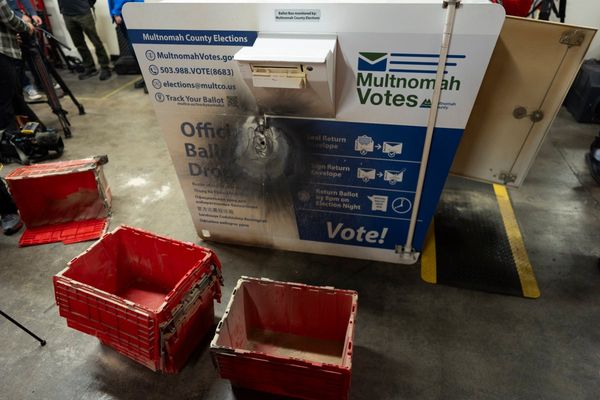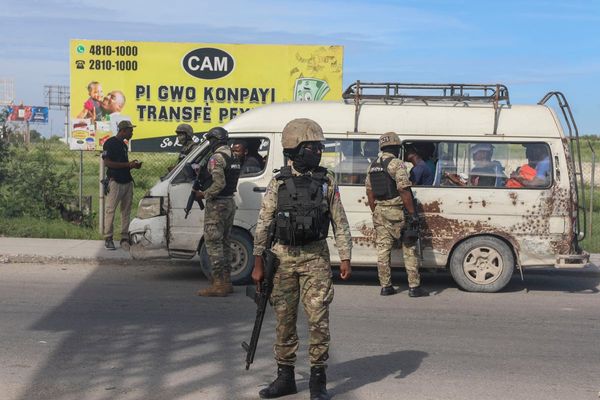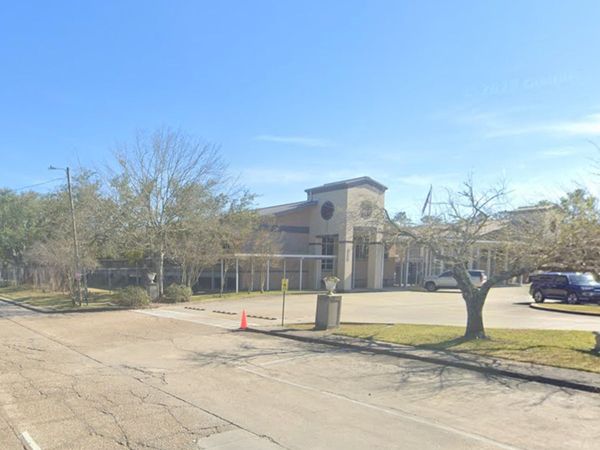In the bombastic world of superhero cinema, few things are more refreshing than a dose of good old-fashioned nihilism – the kind of chaotic, anti-authoritarian streak that can upend the tiresome, planet-saving morality of the genre. It's part of the appeal of DC Comics' Suicide Squad, a gang of anarchic, D-list villains recruited by a cynical government agency for top secret missions, whose only hope of escaping prison is to carry out their masters' bidding or face instant, explosive execution.
Five years ago, the squad's first, underwhelming film met with commercial success but decidedly mixed reviews, and now they're back in a sequel written and directed by James Gunn, whose Guardians of the Galaxy adventures for Marvel showed he knows his way around an obnoxious, wisecracking cohort.
Effectively a reboot of the franchise, The Suicide Squad has the benefit of ditching the exposition that tended to bog down its predecessor: Viola Davis's secret-ops boss is quick to assemble a fresh team, including repeat offenders Harley Quinn (Margot Robbie) and Captain Boomerang (Jai Courtney), and newcomers Blackguard (SNL star Pete Davidson) and Weasel (voiced by Sean Gunn) – a neurotic, humanoid critter who's an instantly funny standout but, like many on this doomed crew, sadly doesn't make it to see the film's opening credits.
Instead, the movie pivots to a second suicide squad: led by group veteran Rick Flag (Joel Kinnaman), they include crack mercenary Bloodsport (a commanding Idris Elba), the gung-ho, ironically named Peacemaker (John Cena, sporting ridiculous superhero cosplay), and science-experiment-gone-wrong Polka-Dot Man (David Dastmalchian), whose superpower is – you guessed it – the ability to unleash lethal polka dots upon his enemies, like some quirky retro dress shop from hell.
There's also Ratcatcher 2 (the spirited Daniela Melchior), who somehow isn't a sequel to Lynne Ramsay's social-realist film but the offspring of the original, rodent-commanding villain (a cameoing Taika Waititi); and a hulking, anthropomorphic shark in surf shorts named Nanaue – who's voiced, monosyllabically, by none other than that master of movie grunts, Sylvester Stallone.
Their mission, because they have no choice but to accept it: infiltrate a fictitious South American island nation under military rule, and stop an experimental project involving a deadly extraterrestrial monster from falling into the wrong hands.
Or so they think.
"We're all gonna die," groans Bloodsport.
"I hope so," comes Polka-Dot's less-than-reassuring reply.
Even Z-grade comic-book movie villains are cannon fodder for the imperial war machine, it seems, and if you look hard enough there's a vague thread about American geopolitical meddling nestled somewhere between all the relentless shoot-outs and explosions.
That the suicide squad are hardened prisoners turned expendable military resource might even – at a stretch – be taken as a comment on the inequities of the American carceral system, no matter that one of them is, well, an oafish shark-man with a taste for human flesh. The film even opens with Johnny Cash's live version of Folsom Prison Blues, which will either have you rolling your eyes or cheering-on these miscreants from the very first frame.
But for the most part this is a pretty standard, well-oiled comic-book action piece, with lots of overly familiar jokes, a truckload of mummy and daddy issues, and some heavily fetishised – if largely cartoonish – bursts of violence, like Harley Quinn mowing down a small army of Latino soldiers with a hand cannon that turns geysers of blood into flowers.
This kind of flippant, bloodthirsty carnage isn't so much offensive as it is verging on tedious at this point – once you've seen one head explode in graphically rendered detail, you've seen them all, really.
Fans will be plenty sated.
For Gunn, a self-styled iconoclast who honed his skills in low-budget splatter farm Troma, the violence and gags have become something of an aesthetic trap: all the things that might once have been irreverent, even outré, are merely de rigueur these days – jokes about buttholes and bags of dicks just feel like every second comedy show on television, and it all amounts to a somewhat wearying career path for a filmmaker now comfortably into his 50s.
Where previous Suicide Squad director David Ayer seemed to be pushing toward some kind of darkness and weight before Warner Bros allegedly gutted his film and overlaid it with a jukebox of hits, Gunn's predilection for classic FM-radio needle drops plays right into the tone of the new film.
Gunn is good at what he does, for better and sometimes worse – in a way, he's almost too well suited to the assignment, and the lack of surprises shows.
What the filmmaker hasn't lost sight of, fortunately, is his sense of comic-book absurdity. There's a climactic sequence here involving a giant, cycloptic starfish that hits on the perfect tone of goofy terror, with a kaiju ambling and crashing its way through a city with the awkward gait of the Stay Puft Marshmallow Man if he'd been crossed with SpongeBob's Patrick Star.
It's a thoroughly entertaining sequence that – unlike so many other superhero movies – manages to save the best bits for the big battle, though it makes you wish the same sense of outsized fun had pervaded the film's earlier, more routinely violent passages.
The Suicide Squad is blessed, of course, to have stars with the presence of Elba, and especially Robbie, who continues to electrify the action with her unhinged performance – even if it's a shame to see her back in this heavily macho fantasy world, after last year's vastly more vibrant and playful Birds of Prey.
In one scene, her Harley Quinn is feted by the despotic leader of the military regime, who compliments her track record of rebelliousness in the face of "American oppression". It's a moment that dangles a tantalising thread, one in which these antiheroes might become the true heroes, ready to rupture the dominant narratives of Marvel and DC's nationalistic crimefighters.
Predictably, it amounts to little. In the end there's no more subversiveness to these characters than the superheroes against whom they supposedly stand – they're just another brand of hero who've swapped one code of morality for another, in service of their country and the kind of cinema that real anarchists would reject.
If only they'd let the weasel be the star.
The Suicide Squad is in cinemas from August 5.







